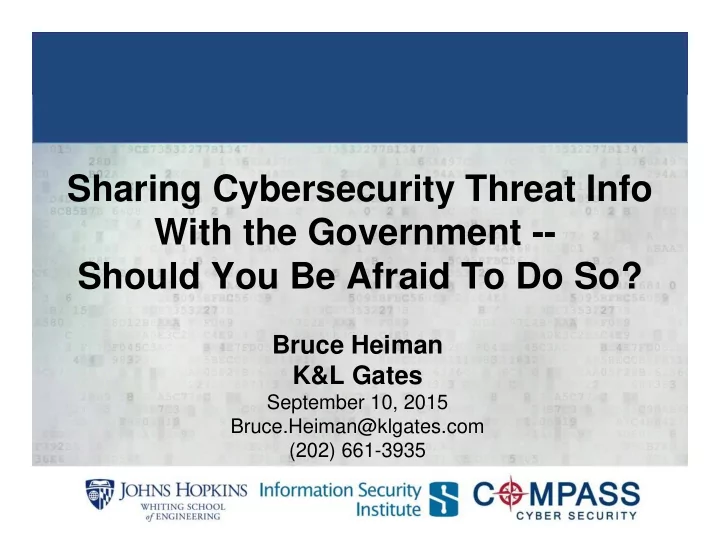

Sharing Cybersecurity Threat Info With the Government -- Should You Be Afraid To Do So? Bruce Heiman K&L Gates September 10, 2015 Bruce.Heiman@klgates.com (202) 661-3935
Why share information? • Prevention • Timely exposure of threats & vulnerability • USG uniquely able to provide threat information/foreign intelligence • Facilitates effective cooperation on best way to prevent, detect, address potential harm • Protection • USG can distribute information more broadly • USG can help mitigate damage • Prosecution • USG better positioned to investigate, arrest, pursue cybercriminals domestically and internationally *
Why not share information? • Premature escalation • Lose control of investigation/response • Invite further attacks • Reputational harm • Regulatory enforcement (criminal/civil) • State Attorneys General actions • Civil suits (class actions) by those whose data is compromised • Shareholder suits • Congressional investigations • International enforcement *
Sources of legal requirements Federal : • FTC • HIPAA • SEC COPPA • • GLBA • UCC • FCRA/FACTA • FAR State Data breach/cybersecurity laws (47) • • UDAP Common Law • Negligence Breach of contract • International • EU (Privacy Regulation) • Nation states *
Types of allegations • Failure to do what you say • Deceptive practice • Intentional/negligent misrepresentation • Failure to say what you should • Failure to (timely) disclose material facts • Failure to do what you should Failure to take reasonable security measures (unfair) • • Negligence • Breach of fiduciary duty/duty of care • Breach of contract • Failure to disclose a problem • Failure to timely notify of data breach • Failure to adequately explain the data breach *
So -- How to realize benefits of information sharing and avoid negative consequences? Answer: Provide protection to companies to incentivize the voluntary sharing of information among private parties and with the government . *
Current pending legislation • House: • Protecting Cyber Networks Act [HR 1560] • National Cybersecurity Protection Advancement Act [HR 1731] • Senate: • Cybersecurity Information Sharing Act (CISA) [S. 754] *
Five Key Questions • Share what kind of information? • Need to scrub personal information? • With which USG departments (and who will they share it with)? • What can the information be used for? • What legal liability protection will I have? *
Share what kind of information? • “Cyber threat indicator or defensive measure” • Malware used by malicious actors to compromise computer networks • Measures to defend an entity’s own information networks and system (and those of customers if authorized) *
Need to scrub personal information? • Yes need to: • Assess and remove any known personal information identifying a specific person not directly related to a cybersecurity threat or • Implement and utilize a technological capability configured to remove such personal information *
Share with which USG departments (and who will they share it with)? • Idea is to create a central portal – DHS and formal process • Information then rapidly dispersed • Key issue allegedly is whether information is thereafter shared with DoD and NSA • A business regulated by a federal agency may share information with that agency and receive protection • Companies may share information informally with any agency and receive protection [Senate] *
How may the information be used? • Cybersecurity purposes! • But also: to prevent to respond to the imminent threat of serious national harm, harm to a minor, fraud and identity theft, espionage and trade secrets (Senate – House broader) • Not to regulate, including by way of enforcement actions, lawful activities • Important! Those sharing information with the government may impose restrictions on it to use. *
What legal liability protections will I have? • No cause of action for monitoring, sharing or receiving cybersecurity threat information (and acting, or in good faith not acting, on it) • No waiver of any privilege or protection (including trade secret protection) • No antitrust violation from sharing information (but cannot fix prices, monopolize etc.) • Exempt from disclosure under federal or state or local FOIA laws • Exempt from disclosure under any ex parte requirements • No limitation on otherwise applicable statutory defenses • But assumes good faith and reasonable actions • Does not protect against gross negligence or willful misconduct *
Hot topic – defensive measures • For the first time, pending legislation authorizes “defensive measures” but does not extend legal protection • Intent: measures to defend one’s own networks and systems (and those of customers if authorized by them) • Not intended to authorize “offensive” measures such as unauthorized access to, or executing computer code on, another entity’s information systems • But recognize that actions on one’s own system can have effects on another’s system • Ok unless would substantially harm another entity’s system *
QUESTIONS? Bruce Heiman K&L Gates Bruce.Heiman@klgates.com (202) 661-3935 *
Recommend
More recommend